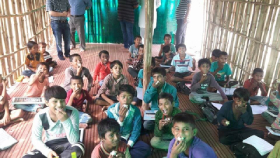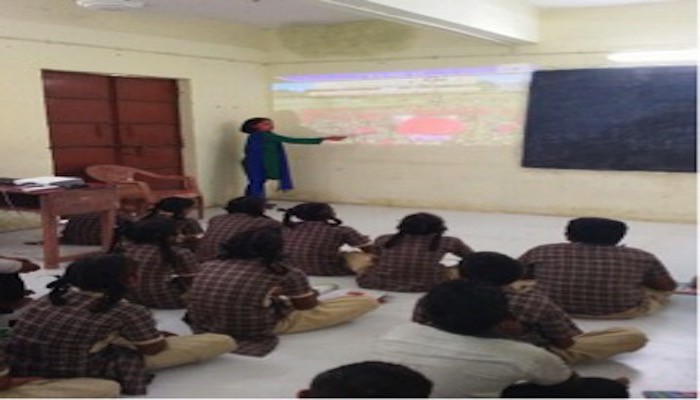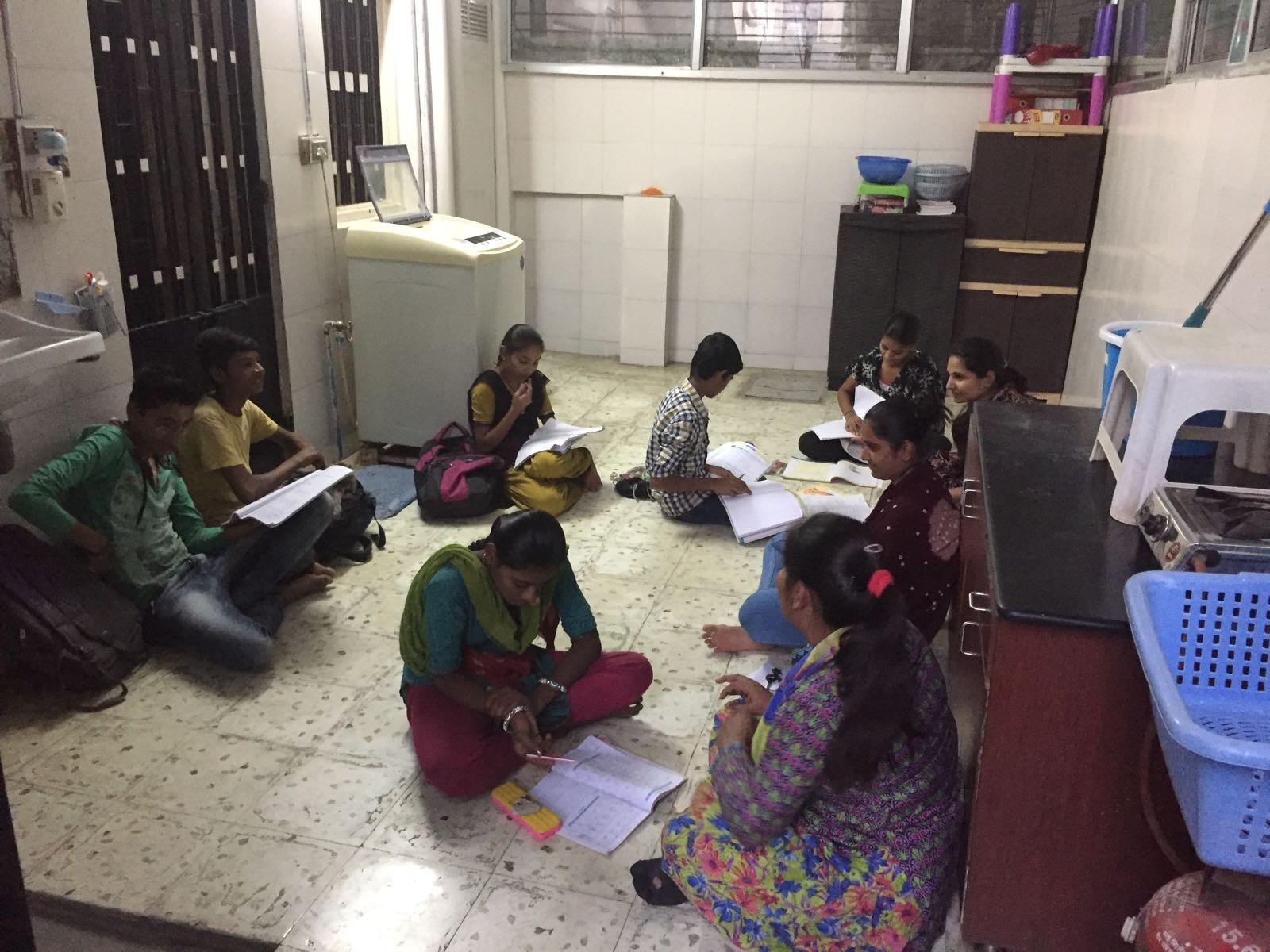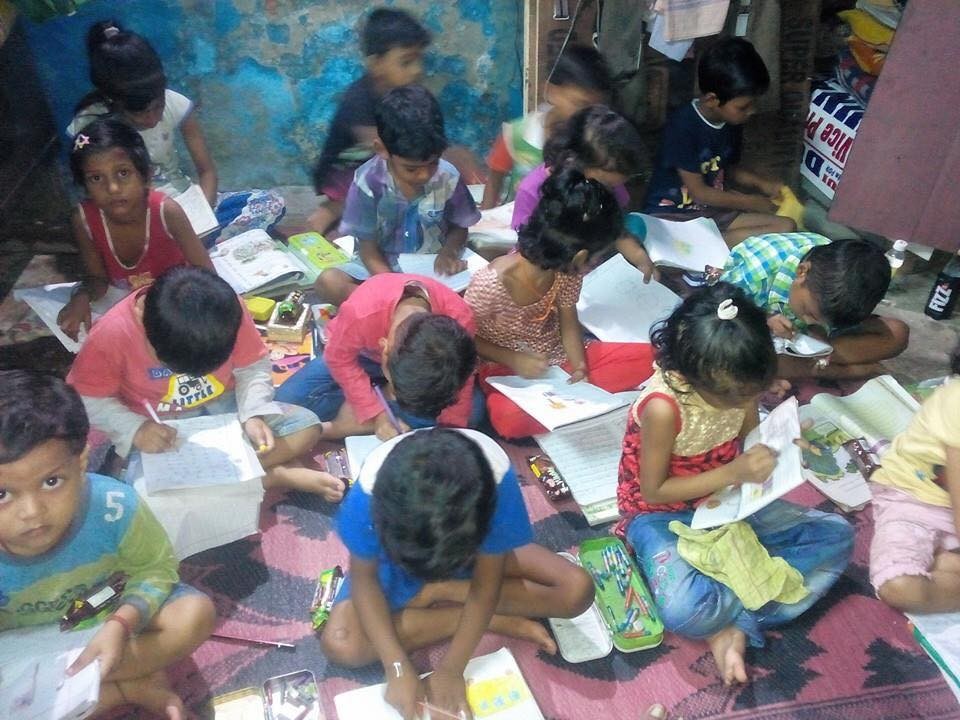OUR IMPACT
Enhancing Learning Through Smart Classes in Kathua, J&K Schools
Kathua
KarmaKonnect has introduced Smart Classes at BVM Nagrota Prehta Basholi (Kathua), J&K, to revolutionize the learning experience for students. This initiative integrates technology-driven teaching tools to enhance engagement, improve comprehension, and make education more accessible, particularly for visual learners.
• Improve student learning outcomes through interactive digital education by integrating smart class technology that transforms traditional teaching methods into dynamic, engaging experiences, helping students grasp concepts with ease. The use of interactive tools such as videos, animations, and simulations creates a more immersive learning environment, ensuring that students understand complex subjects better. Visual and auditory learning aids enhance comprehension, especially for students who struggle with text-heavy materials, making education more inclusive and effective. Enhance engagement and retention by using multimedia tools that cater to different learning styles, ensuring that students not only understand concepts but also remember them for longer periods.
• Gamification and real-time quizzes keep students interested, encouraging active participation in lessons and fostering a love for learning. Provide access to modern educational resources in remote and underprivileged schools where traditional teaching methods and infrastructure are inadequate. Many students in rural areas lack exposure to interactive and technology-driven education, and smart classes help bridge this gap by offering digital learning experiences similar to those in urban schools. Support teachers in delivering more effective and engaging lessons by equipping them with advanced teaching tools, allowing them to explain subjects with clarity and confidence.
• Teachers can use digital resources to supplement textbook learning, helping students visualize abstract concepts and making lessons more dynamic. Encourage a technology-driven approach to learning by familiarizing students and teachers with digital platforms, preparing them for a world increasingly reliant on technology.
Infrastructure Setup: The installation of smart boards, projectors, and digital learning resources ensures that classrooms are equipped with the necessary tools to facilitate interactive learning. Teacher Training: Workshops are conducted to train teachers on how to use smart class tools, enabling them to effectively integrate technology into their teaching.
• Limited Digital Literacy: Many teachers and students in remote areas lack familiarity with digital tools, making it difficult for them to use smart class technology effectively. To bridge this gap, hands-on training sessions are conducted, enabling teachers to confidently integrate digital tools into their lessons and students to navigate the new learning platforms. Training modules focus on basic computer skills, operating smart boards, using educational software, and troubleshooting common technical issues, ensuring a smooth transition to digital learning. Workshops and refresher courses are organized periodically to keep educators updated on the latest advancements in smart class technology.
• Power & Connectivity Issues: Many rural schools suffer from frequent power cuts and unreliable internet access, which can disrupt digital learning sessions. To address this, offline learning solutions such as preloaded educational content on USB drives, tablets, and digital projectors are provided, allowing classes to continue even without internet access. Backup power sources like solar panels or inverters are installed to ensure uninterrupted use of smart class equipment during power outages.
• Adoption Resistance: Some teachers and parents may be hesitant to embrace smart classes, fearing that traditional teaching methods will become obsolete or that digital learning may not be as effective. To overcome this, awareness programs, demonstration sessions, and success stories from other schools are shared to highlight the benefits of interactive learning. By actively engaging stakeholders, addressing concerns, and providing continuous support, the program ensures a smooth transition towards digital education, ultimately improving learning outcomes for students.
• Increased student participation and interest in learning: The introduction of smart classes has made learning more engaging, with students actively participating in lessons rather than passively listening to lectures. Interactive elements like quizzes, animations, and simulations make even complex subjects exciting, leading to greater enthusiasm for learning.
• Improved comprehension and retention of complex subjects: Visual and interactive learning methods help students grasp difficult concepts faster by presenting information in an easy-to-understand format. For instance, animated science experiments and historical recreations allow students to visualize abstract ideas, making them more memorable and easier to recall.
• Enhanced teaching efficiency through digital tools: Teachers can use pre-designed lesson plans, multimedia content, and interactive exercises to deliver more structured and engaging lessons. With digital assessments and real-time feedback, educators can quickly identify students' learning gaps and adjust their teaching methods accordingly.
• A scalable model that can be expanded to other schools in remote areas: The success of smart classes in one school provides a replicable framework that can be implemented in other underprivileged areas. By addressing key challenges such as digital literacy and infrastructure, the program can be customized and scaled based on the specific needs of different regions.
• As more schools adopt smart class solutions, a network of trained teachers and digital learning hubs can be developed to support further expansion. Ultimately, this model helps bridge the educational divide, ensuring that students in remote and underprivileged communities receive the same quality of education as those in urban areas.
KarmaKonnect is a non-profit social venture that aims to connect the fragmented ‘giving’ ecosystem by empowering NGOs, donors, volunteers, corporates and government to create impactful social development interventions. KarmaKonnect is an enabler; motivating and empowering individuals and organizations to tap the growing philanthropy landscape by creating, connecting, and/or collaborating for credible projects and causes. The KarmaKonnect team is currently involved in a number of initiatives across the country, through various dedicated volunteers and NGOs. We are primarily working on:
• Child education and livelihood skills (slum evening schools/shelters and aiding low income govt schools) in Gujarat, Telangana, MP and Delhi through utilization of existing govt infrastructure and innovative collaborative models.
• Women Empowerment and legal help, rescue and rehabilitation projects (primarily on Gujarat and UP)
• Rural Empowerment and Citizens Change/Awareness programs (Gujarat, MP, UP, Telangana and Rajasthan).
• We also Executing comprehensive "adopt a village" projects for donors involving well researched sustainable solutions for development
• Training and placement of specially abled
• Refuge rehabilitation projects. (Urban slums)
• Adhoc Medical help and assistance as needed.
• Improve student learning outcomes through interactive digital education by integrating smart class technology that transforms traditional teaching methods into dynamic, engaging experiences, helping students grasp concepts with ease. The use of interactive tools such as videos, animations, and simulations creates a more immersive learning environment, ensuring that students understand complex subjects better. Visual and auditory learning aids enhance comprehension, especially for students who struggle with text-heavy materials, making education more inclusive and effective. Enhance engagement and retention by using multimedia tools that cater to different learning styles, ensuring that students not only understand concepts but also remember them for longer periods.
• Gamification and real-time quizzes keep students interested, encouraging active participation in lessons and fostering a love for learning. Provide access to modern educational resources in remote and underprivileged schools where traditional teaching methods and infrastructure are inadequate. Many students in rural areas lack exposure to interactive and technology-driven education, and smart classes help bridge this gap by offering digital learning experiences similar to those in urban schools. Support teachers in delivering more effective and engaging lessons by equipping them with advanced teaching tools, allowing them to explain subjects with clarity and confidence.
• Teachers can use digital resources to supplement textbook learning, helping students visualize abstract concepts and making lessons more dynamic. Encourage a technology-driven approach to learning by familiarizing students and teachers with digital platforms, preparing them for a world increasingly reliant on technology.
Infrastructure Setup: The installation of smart boards, projectors, and digital learning resources ensures that classrooms are equipped with the necessary tools to facilitate interactive learning. Teacher Training: Workshops are conducted to train teachers on how to use smart class tools, enabling them to effectively integrate technology into their teaching.
Project Challenges
• Limited Digital Literacy: Many teachers and students in remote areas lack familiarity with digital tools, making it difficult for them to use smart class technology effectively. To bridge this gap, hands-on training sessions are conducted, enabling teachers to confidently integrate digital tools into their lessons and students to navigate the new learning platforms. Training modules focus on basic computer skills, operating smart boards, using educational software, and troubleshooting common technical issues, ensuring a smooth transition to digital learning. Workshops and refresher courses are organized periodically to keep educators updated on the latest advancements in smart class technology.
• Power & Connectivity Issues: Many rural schools suffer from frequent power cuts and unreliable internet access, which can disrupt digital learning sessions. To address this, offline learning solutions such as preloaded educational content on USB drives, tablets, and digital projectors are provided, allowing classes to continue even without internet access. Backup power sources like solar panels or inverters are installed to ensure uninterrupted use of smart class equipment during power outages.
• Adoption Resistance: Some teachers and parents may be hesitant to embrace smart classes, fearing that traditional teaching methods will become obsolete or that digital learning may not be as effective. To overcome this, awareness programs, demonstration sessions, and success stories from other schools are shared to highlight the benefits of interactive learning. By actively engaging stakeholders, addressing concerns, and providing continuous support, the program ensures a smooth transition towards digital education, ultimately improving learning outcomes for students.
Results & Outcome
• Increased student participation and interest in learning: The introduction of smart classes has made learning more engaging, with students actively participating in lessons rather than passively listening to lectures. Interactive elements like quizzes, animations, and simulations make even complex subjects exciting, leading to greater enthusiasm for learning.
• Improved comprehension and retention of complex subjects: Visual and interactive learning methods help students grasp difficult concepts faster by presenting information in an easy-to-understand format. For instance, animated science experiments and historical recreations allow students to visualize abstract ideas, making them more memorable and easier to recall.
• Enhanced teaching efficiency through digital tools: Teachers can use pre-designed lesson plans, multimedia content, and interactive exercises to deliver more structured and engaging lessons. With digital assessments and real-time feedback, educators can quickly identify students' learning gaps and adjust their teaching methods accordingly.
• A scalable model that can be expanded to other schools in remote areas: The success of smart classes in one school provides a replicable framework that can be implemented in other underprivileged areas. By addressing key challenges such as digital literacy and infrastructure, the program can be customized and scaled based on the specific needs of different regions.
• As more schools adopt smart class solutions, a network of trained teachers and digital learning hubs can be developed to support further expansion. Ultimately, this model helps bridge the educational divide, ensuring that students in remote and underprivileged communities receive the same quality of education as those in urban areas.
About Ngo
KarmaKonnect is a non-profit social venture that aims to connect the fragmented ‘giving’ ecosystem by empowering NGOs, donors, volunteers, corporates and government to create impactful social development interventions. KarmaKonnect is an enabler; motivating and empowering individuals and organizations to tap the growing philanthropy landscape by creating, connecting, and/or collaborating for credible projects and causes. The KarmaKonnect team is currently involved in a number of initiatives across the country, through various dedicated volunteers and NGOs. We are primarily working on:
• Child education and livelihood skills (slum evening schools/shelters and aiding low income govt schools) in Gujarat, Telangana, MP and Delhi through utilization of existing govt infrastructure and innovative collaborative models.
• Women Empowerment and legal help, rescue and rehabilitation projects (primarily on Gujarat and UP)
• Rural Empowerment and Citizens Change/Awareness programs (Gujarat, MP, UP, Telangana and Rajasthan).
• We also Executing comprehensive "adopt a village" projects for donors involving well researched sustainable solutions for development
• Training and placement of specially abled
• Refuge rehabilitation projects. (Urban slums)
• Adhoc Medical help and assistance as needed.





